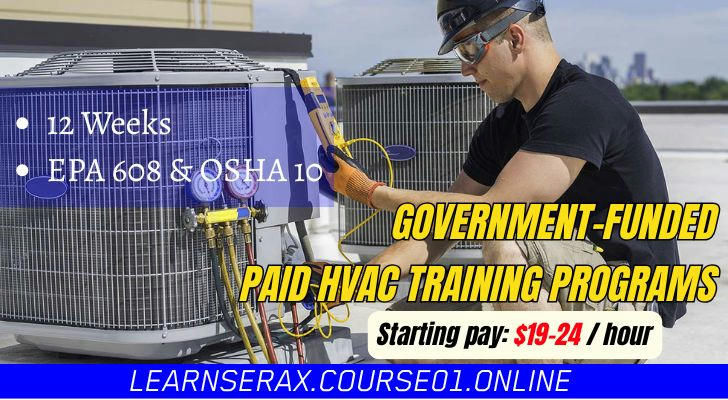✨ Comprehensive Guide to Government-Funded and Paid HVAC Training Programs: Quick Start and Career Support ✨
Facing the high costs and scattered information about HVAC technician training? This guide consolidates practical insights on government-funded and paid training options to help aspiring technicians understand eligibility, course content, and employment support, paving the way for a stable career in the HVAC industry.

🔹 Government-Funded HVAC Training Programs: Eligibility and Quality Resources Explained 🔹
- Program Example: Bucks County Community College’s grant-funded HVAC training starting April 2026
- Duration: 12 weeks combining classroom instruction with hands-on experience in a state-of-the-art facility
- Eligibility Requirements:
✅ U.S. citizenship or Green Card status
✅ High school diploma or GED
✅ Passing background and aptitude tests - Certifications Included: OSHA 10, EPA 608, NATE (valued at $6,500)
- Additional Benefits:
🔹 Job placement support through direct connections with local employers
🔹 Special encouragement for veterans - Ideal For: Those seeking a cost-effective, structured pathway into HVAC careers with recognized credentials
🔸 Advantages of Paid HVAC Training: Learn While Earning and Tools provided 🔸
- Program Example: CoolSys 12-week paid training program
- Key Features:
💼 Trainees receive compensation during training
🎁 Starter hand tool kit valued at $500 (includes meters, amp clamps, essential instruments)
👨🏫 Training by award-winning instructors in advanced facilities
🤝 Mentorship from certified technicians - Certifications Earned: EPA 608, OSHA 10
- Career Support:
🔹 Hundreds of nationwide job opportunities post-completion
🔹 Relocation assistance and continuous education for career advancement
🔹 Comprehensive benefits including health insurance and 401k - Note: Paid training programs may have minimum service terms and breach clauses; refer to the signed training agreement for details.
📝 Detailed Core Curriculum: Blending Theory with Practical Skills 📝
| Core Curriculum Components | Description |
|---|---|
| Safety Protocols | Emphasis on workplace and personal safety |
| Shop Math | Calculations essential for HVAC tasks |
| Electrical Principles | Fundamentals of electrical systems |
| Heating, Ventilation & Refrigeration | Hands-on and theoretical HVAC fundamentals |
| DOE Energy Efficiency Techniques | Specialized energy-saving methods |
| Blueprint Reading | Understanding and interpreting technical diagrams |
- Training Hours: Bucks County’s 288-hour course integrates classroom and practical skill development
- Apprenticeships: Multi-year programs combining evening classes with on-the-job experience
- Outcomes: Develop technical proficiency, problem-solving skills, and industry-standard knowledge for installation, maintenance, and troubleshooting
📌 Eligibility Criteria and Application Process: Essential Steps to Secure Enrollment 📌
- Common Requirements:
✅ U.S. citizenship or Green Card
✅ High school diploma or equivalent
✅ Minimum age 18
✅ Drug screenings and background checks
✅ Physical exams and aptitude tests (electro-mechanical skills)
✅ Reliable transportation for in-person attendance - Application Steps:
▪ Submit application forms or emails to program contacts
▪ Attend interviews or information sessions
▪ Example: Bucks County requests emailing an admissions coordinator to reserve spots
▪ Apprenticeships have annual application windows with submission deadlines - Reminder: Understanding requirements and timelines is crucial for smooth enrollment
📈 Career Outlook and Professional Growth: Salary Expectations and Advancement Opportunities 📈
| Aspect | Details |
|---|---|
| Entry-Level Salary | $19 to $24 per hour (~$39,000 to $50,000 annually) |
| Work Schedule | Full-time with potential overtime during peak seasons |
| Job Security & Roles | Enhanced by certifications; roles include installation, maintenance, sales, management |
| Job Placement Support | Direct employer connections and assistance available |
| Advancement Opportunities | Specializations in preventive maintenance, commercial refrigeration, supervisory roles |
| Education & Training Support | Tuition reimbursement and company-sponsored training |
- Summary: The HVAC field offers stable employment and upward mobility for those committed to continuous learning and skill development.
💬 This guide aims to provide a clear roadmap for anyone considering HVAC training, whether through government-funded or paid programs, ensuring informed decisions toward a rewarding career path.
